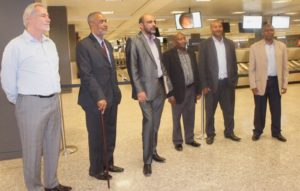by David Brewin
After the independence of Zanzibar in 1964 and the subsequent violent revolution, a pattern was established under which the Zanzibar government was re-elected every five years. There were only two significant parties – the ruling CCM or ‘revolutionary party’ which was the majority party in the main and larger Unguja island and the only significant opposition party – the Civic United Front (CUF) which always won a few seats in the House of Representatives in Unguja but had overwhelming support in the other smaller island of Pemba.
Zanzibaris tend to take elections very seriously and the atmosphere during elections is usually intense. In each election a few incidents of violence were witnessed. The CCM won each time, usually with a very small majority and always with complaints from CUF that the CCM had rigged the elections.
After the elections of 2010, the two parties finally came together in a ‘Government of National Unity’ which reduced much of the interparty animosity.
However, during the largely peaceful 2015 elections, the Zanzibar Electoral Commission (ZEC) suddenly stopped the counting of votes saying that there had been irregularities, especially in Pemba. Both sides claimed to have won [see TA 113 and 114].
The CCM then said that there would be another election on March 20th 2016. CUF decided to boycott this and were joined by a group of very small parties. CUF wanted the results of the previous (2015) election to be accepted.
In the second election the number of people voting was only about 15% of the electorate and CCM got an unprecedented 91% of the vote. Nine out of 14 small parties joined CUF’s boycott. Another new feature was that three smaller, previously hardly known parties, won seats and subsequently supported the CCM in the Zanzibar House of Representatives, enabling it to claim an element of legitimacy for a continuation of its rule.
CUF’s difficult position
CUF is now in a very difficult position as it has no MPs in the House of Representatives and the population of Zanzibar is only about 1.5 million compared with the massive 45 million on the mainland supported by a substantial army.

The CUF delegation with Seif Sharrif Hamad (second left) and Ismail Jussa (third left) arriving at Dules airport Washington DC on June 11.
CUF is taking various actions to help it to survive; It is trying to launch a campaign of civil disobedience and has produced a report titled: “Human Rights Violations by Security Organs against the Opposition in Zanzibar 2015-2016.”
It said that it was going to file a case at the High Court against the Inspector General of Police and the Minister for Home Affairs for what it termed as ‘atrocities committed by police and other security organs against its supporters during the election’. Taking journalists through the report, CUF’s Acting Director for Human Rights, Ms Pavu Juma Abdallah, said that more than a thousand people had been directly affected by the ‘atrocities’ which she said had been committed during the election campaign. She added that it had all started on March 24 last year, when a CUF office in Dimani was torched. Five days later a militia attacked CUF supporters on their way from a rally in Makunduchi. A number of CUF supporters were said to have fallen victim to a wave of attacks including from uniformed police officers and other security operatives, which left six people with gunshot wounds. According to her, the data that CUF collected from the ground indicated that 300 people had been arrested by security officials. Some hundreds were said to have been beaten, 70 houses belonging to CUF supporters were destroyed. CUF said that it would use these figures to speed up the processes of helping The Hague-based International Criminal Court (ICC) to open investigations against “all those who perpetuated the atrocities.” CUF intends to send evidence to President Magufuli, and all local and international human rights organisations to give them a first-hand account of the alleged abuses.
In July-August, there was a visit by a CUF delegation, led by Secretary General Seif Sharrif Hamad, to the USA, Canada, Britain and other European countries to explain the dangers which might lie ahead. He repeatedly warned of unrest in the isles if the present situation continued; Radicals would find an opening in Zanzibar, an archipelago with a 98% Muslim population.
Zitto Kabwe, MP for Kigoma and the leader of the small opposition ACT-Wazalendo Party, told The African Report that Zanzibar was “boiling”. There was is no legitimate government in Zanzibar and “I am worried that people will go to the streets”.
Many political analysts said that leaving CUF, which had been a powerful opposition force in the past 20 years, out of politics, could have serious repercussions on democracy and peace.
A statement issued by 16 high commissioners and ambassadors to Tanzania, condemned the ZEC decision to annul the Zanzibar election.
European Union reactions
The European Union clearly had some difficulty in reacting to the Zanzibar election results. Eventually it decided to maintain minimal contact with the government of Zanzibar’s President Ali Mohammed Shein because of the decision of the ZEC to annul the election results without providing evidence to justify “this unprecedented decision”.
The second election was boycotted by 9 out of 14 political parties, which had participated in the November 2015 poll.
Nape Nnauye, the ruling CCM party’s Publicity and Ideology Secretary, said that his party would go to the second polls regardless of any boycotting because ‘not all political parties have been fielding candidates in every election’.

Pingback: Deportation Spree and Risk of Burning Bridges | Jumuiya review